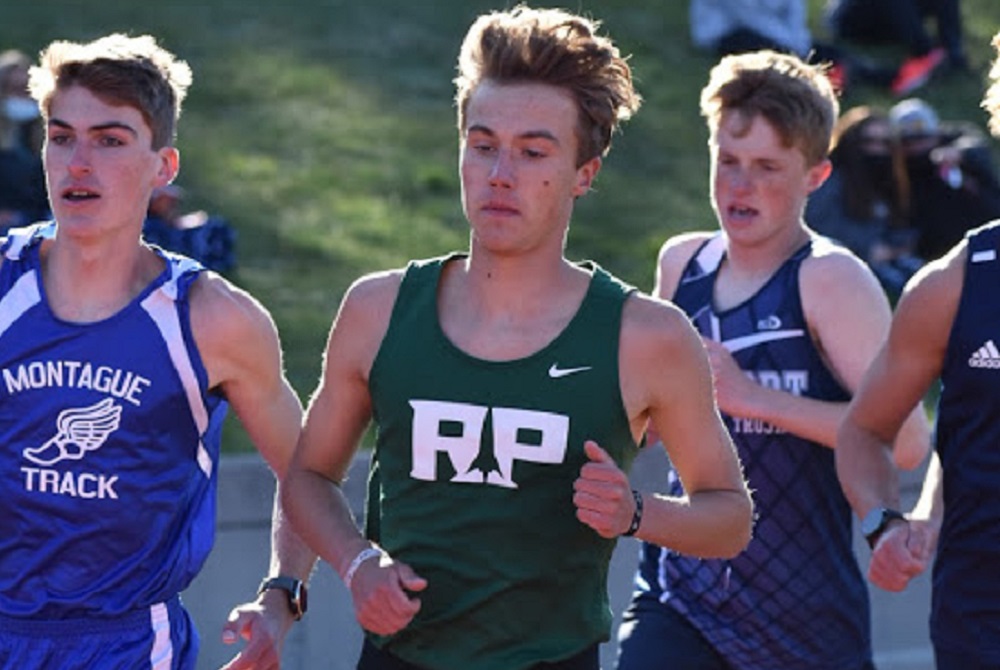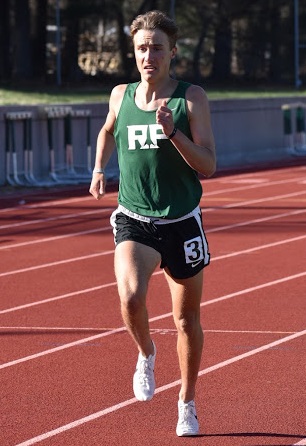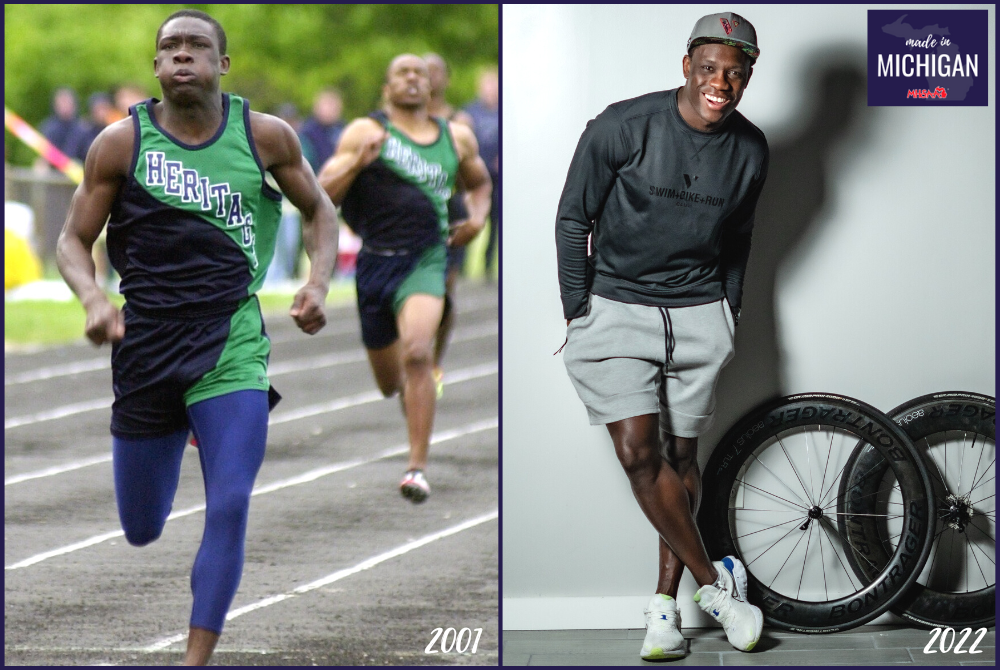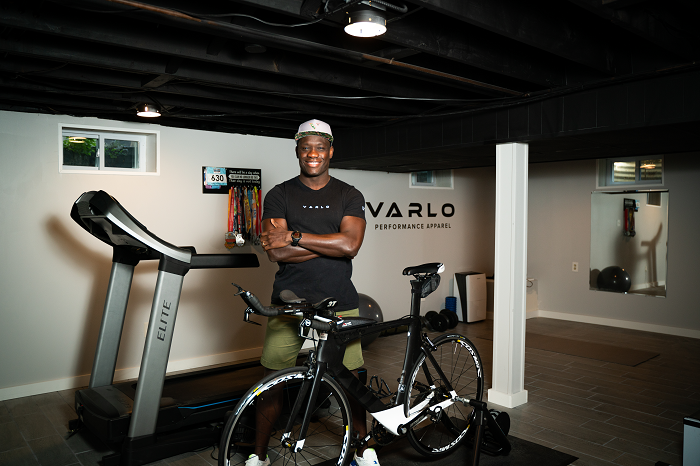
Reeths-Puffer ‘Ironman’ Slows Down to Help Team Surge
By
Tom Kendra
Special for MHSAA.com
May 6, 2021
Klay Grant’s strategy going into last week’s Greater Muskegon Athletic Association city track meet seemed, at first, counterintuitive.
 “My plan was to try and run each event as slow as possible,” said Grant, a junior at Muskegon Reeths-Puffer, before adding:
“My plan was to try and run each event as slow as possible,” said Grant, a junior at Muskegon Reeths-Puffer, before adding:
“And still win.”
His plan to conserve energy – essentially sacrificing fast times for himself to try and gather as many points as possible for his team – worked to perfection as Grant became the first athlete in the 65-year history of the GMAA meet to take first place in the four longest events.
Grant’s “Ironman” performance and four first-place finishes accounted for 40 of his team’s 132 points, helping the Rockets edge six-time reigning champion Fruitport and win the meet for the first time since 2006.
Grant started his record-breaking night by running the anchor leg on R-P’s winning 3,200-meter relay team (8:40.84), then followed with wins in the open 1,600 (4:42.94), 800 (2:07.25) and 3,200 (10:29.69).
“Klay is all about the team,” explained Reeths-Puffer boys track coach Don Ketner, who is in his 15th year. “He’s the kind of kid that would give the shirt off of his back for you, and that’s basically what we asked him to do on Friday night.”
The GMAA Meet, known locally simply as the “City Meet,” dates back to the 1950s, and during its long history many male and female athletes have won four events. However, that feat normally happens with sprinters in short events and relays or with an athlete who picks up a win or two in the field events before the running finals begin.
Grant was the first to capture all four of the longest running events, but he said that individual feat was secondary. He said the best part was helping to deliver a memorable night for Reeths-Puffer, as his family is heavily invested in the Muskegon County school district and its track & field and cross country programs.
Both of his parents, Darren and Angie Grant, are Reeths-Puffer graduates and runners who went on to run in college at Indiana Wesleyan and now teach and coach in the R-P district. Darren Grant, who teaches fifth grade, is the Rockets’ head cross country coach and assistant boys track coach. Angie Grant teaches special education at the middle school and is the head girls track coach.
 “It was fun to be a part of such a great night,” said Grant, 17, who plans to go into the ministry and pursue Biblical studies in college. “Faith encompasses everything that I do, so it felt great to use my gifts to help out my teammates and coaches.”
“It was fun to be a part of such a great night,” said Grant, 17, who plans to go into the ministry and pursue Biblical studies in college. “Faith encompasses everything that I do, so it felt great to use my gifts to help out my teammates and coaches.”
Grant, who is also laser-focused in the classroom with a gaudy 4.333 GPA, is the third of four children. His older siblings are Cole and Kenna, and younger brother Kye is a talented runner on the Reeths-Puffer middle school team.
While running has always been a part of his life because of his parents, his primary sport growing up was soccer. In fact, it wasn’t until last year that he focused exclusively on track and cross country, which is why he believes he can greatly improve his times.
Perhaps the key race of the entire GMAA meet last week was the opening 3,200-meter relay, which Fruitport was favored to win. Ketner gambled that by putting Grant on the anchor leg, he might be able to catch up and pass Fruitport.
As it turned out, strong performances on the first three legs by freshmen Jackson Allen and Tate Bradley and senior Caden Tufts had the Rockets in the lead when Grant got the baton – allowing him to cruise to the tape and make a major statement in the process.
Grant then had a nice stretch of time to rest before his next race, the 1,600, but that was the first of three long races over a short period of time.
After pulling away from Jackson Helmer of Mona Shores in the 1,600, Grant had just three events of rest before getting back on the track for the 800 – the event he will likely focus on for the upcoming Ottawa-Kent Conference Green meet May 13 and the Division 2 Regional on May 20.
Then came the shortest turnaround of the night, with just the quick 200-meter run coming between the 800 and the 3,200.
Grant knew he could empty the tank in the 3,200, and it didn’t take long for Grant and his senior teammate and training partner Brett Schlaff to separate themselves from the rest of the field. With those two running 1-2 ahead of the pack, it was clear that the Rockets would pick up 18 points in that event and clinch the meet title.
The only drama remaining was whether Grant would make history or if the fresher Schlaff would prevail.
“With about 300 meters to go they were still close and I said out loud: ‘Klay is so nice, he’s going to let Brett win,’” said Ketner.
Grant ended up pulling away over the final 200 meters to win the race and make history. Schlaff took a strong second, and the Rockets were on top of the Muskegon city track world for the first time in 15 years.
“My times were nothing special that night, that’s for sure,” said Grant. “But this meet wasn’t about me. This meet was all about the team.”
 Tom Kendra worked 23 years at The Muskegon Chronicle, including five as assistant sports editor and the final six as sports editor through 2011. E-mail him at [email protected] with story ideas for Muskegon, Oceana, Mason, Lake, Oceola, Mecosta and Newaygo counties.
Tom Kendra worked 23 years at The Muskegon Chronicle, including five as assistant sports editor and the final six as sports editor through 2011. E-mail him at [email protected] with story ideas for Muskegon, Oceana, Mason, Lake, Oceola, Mecosta and Newaygo counties.
PHOTOS: (Top) Klay Grant (1) competes in the 800-meter run at the Rocket Invitational on April 16 at Reeths-Puffer. Grant won the race. (Middle) Grant cruises to victory in the 1,600-meter run at the GMAA city meet. (Photos by Payden Challinor.)

Lessons Learned on Track Have Jibowu's Business Surging to Quick Success
By
Paul Costanzo
Special for MHSAA.com
August 1, 2022
Athletics showed Soj Jibowu just how far he could push himself.
All the time spent on the track, working to become the state’s best high school 400-meter runner, and then more than that, taught him to stretch beyond what he thought were his limits.
So, when it came time to make a decision on whether to jump fully into his apparel company, Varlo, or keep it as a part-time side venture, the 2001 Saginaw Heritage graduate knew he could take himself to another level if needed.
Jibowu is the founder and CEO of Varlo, a clothing company that specializes in outfitting triathletes, but also offers casual wear for men and women. The company is just over three years old, but its clientele includes hundreds of triathletes, eight professionals, three NCAA programs and even hospitals. Merchandise is sold in eight countries.
All of that is validation for Jibowu, who took the leap to pursuing the company full-time just one year into its existence.
“When I resigned (from a medical sales job) to do this full-time, my wife was pregnant with our second child, my daughter wasn’t even walking yet,” said Jibowu, who now lives in Cherry Hill, N.J., with his wife and two young children. “Where was my state of mind to leave my very comfortable, high-paying job to pursue this – to sell clothes?”
His mind was in the same place that helped him reach tremendous heights as a runner, both at Heritage and Central Michigan University.
Jibowu, who was born in Nigeria and spent much of his childhood in Huntsville, Ala., was part of some incredible Heritage teams. He graduated a year behind eventual NFL safety Stuart Schweigert, who he ran with on the Finals-winning 1,600 relay in 2000. Another member of that relay was Derold Sligh, who won the 400-meter Finals title that year, setting the Lower Peninsula Division 1 Finals record in the process. The Hawks were LP Division 1 runners-up as a team that season.
“I ran track when I was younger, and I was terrible,” Jibowu said. “In high school, if I look back at it, I probably would have called it impostor syndrome. I think that was me up until maybe like somewhere in my senior year when I started to think, ‘I’m pretty fast.’ … I had so many dominant people around me, in my mind, I was still the slow guy.”
 As a senior, Jibowu erased that self-doubt. He led Heritage to its first, and still only, Division 1 Finals title, running the 400 in 48.28 and breaking the record Sligh had set the year prior.
As a senior, Jibowu erased that self-doubt. He led Heritage to its first, and still only, Division 1 Finals title, running the 400 in 48.28 and breaking the record Sligh had set the year prior.
It was working to get to that point that Jibowu still credits with his ability to push himself in all things.
“I preach this all the time: if you have the ability to be involved in sports at a young age, do it,” Jibowu said. “It’s a gift, first of all. You don’t know any better when you’re young, you think you’re just training your body, but what’s really, truly occurring is you’re training your mind and building discipline. You’re building your character as far as who you are as a person. What is your will? How far are you willing to push? Am I able to be coached? Am I able to learn? Am I able to lose over and over again and keep going? Am I able to navigate to feel what it’s like to win? What you’re truly developing is how to manage and handle life.”
Jibowu said he didn’t finalize his college decision until late in the process, as he had to work on his test scores into the summer. While at CMU, he majored in biomedical science and chemistry, and he excelled, admitting he was a much better student in college than in high school.
He was also reunited with Sligh on the Chippewas track team, and had a successful career. He was regularly within the top five in the 200 and 400 in the Mid-American Conference, and won a MAC title in the 400 at the 2004 indoor championships. His personal bests in the races were 21.19 and 46.81, respectively.
After graduating from CMU, Jibowu began working as a pharmaceutical rep, then moved into medical sales.
While he remained active, it wasn’t until he took a trip to Chicago that he discovered triathlons.
“I remember seeing these really cool bikes and these really fit people, and then they jumped into Lake Michigan,” he said. “And I didn’t know that was possible, because I didn’t grow up swimming. I didn’t know that volume of people knew how to swim like that. Then they get out of Lake Michigan, jump on their bikes and they’re flying. Then they’re sprinting a 6K and I remember thinking, ‘Oh my God, these guys are the real freaking deal.’ I was hooked and wanted to start competing.”
As he began competing, the wheels for his current venture began turning. At this point, Jibowu was living out east and had worked for a pair of successful start-ups in the medical industry. That helped give him knowledge, and confidence, to make his own moves.
“I had always been into clothes and fashion, and how you express yourself with what you wear,” Jibowu said. “There was an opportunity there. The sport of triathlon is as old as me; it started in (1983). That’s a baby. That’s like basketball without the 3-point line. There’s so much opportunity for innovation.”
With that, Varlo was born, and it has since thrived, with Jibowu and the lessons he learned on a track in Saginaw paving the way.
“If you are in high school and have the ability to be in a sport, it’s a gift,” he said. “At that young of an age, truly learning to manage the trials and tribulations of life. That is a gift.”
2021-22 Made in Michigan
July 28: Running Set Life's Stage for Grosse Pointe South's Record-Setting Meier Sisters - Read
July 25: 2005 Miss Basketball DeHaan Cherishing Newest Title: 1st-Time Mom - Read
July 21: Championship Memories Still Resonate with St. Thomas Star Lillard - Read
July 14: Portage Central Champ Rolls to Vanderbilt, Writing Next Chapter in Alabama - Read
July 12: Coaching Couple Passing On Knowledge, Providing Opportunities for Frankfort Wrestlers - Read
June 30: Hrynewich's Star Continuing to Rise with Olympic, Pro Sports Arrivals - Read
PHOTOS (Top) At left, Heritage’s Soj Jibowu wins the 400 meters during the 2001 Saginaw Valley League championship meet. At right, Jibowu is the founder and CEO of the Varlo clothing company. (Middle) Jibowu’s company specializes in outfitting triathletes, and he has taken up the sport after a successful college track & field career. (Heritage photo courtesy of Saginaw News/MLive; current photos courtesy of Soj Jibowu.)

